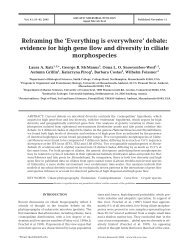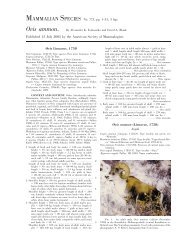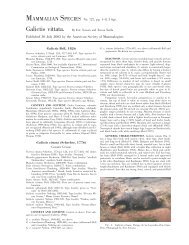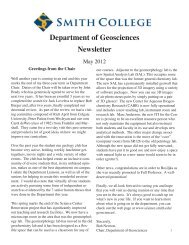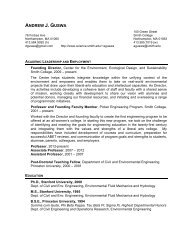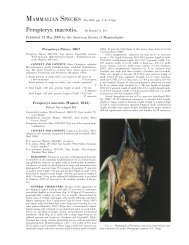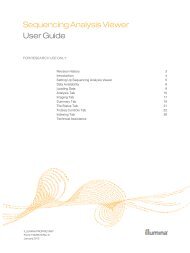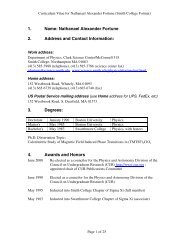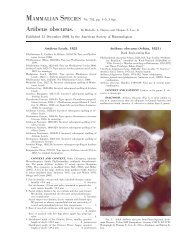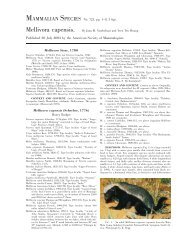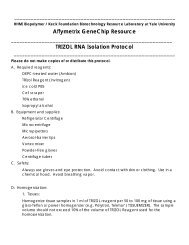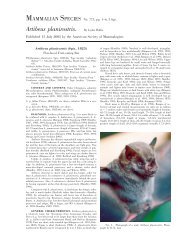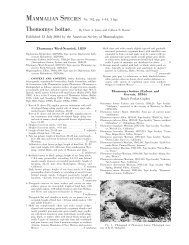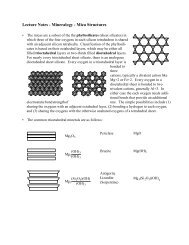Brugia Malayi - Clark Science Center - Smith College
Brugia Malayi - Clark Science Center - Smith College
Brugia Malayi - Clark Science Center - Smith College
You also want an ePaper? Increase the reach of your titles
YUMPU automatically turns print PDFs into web optimized ePapers that Google loves.
Thermoregulation of Various Genes in Escherichia coli K-12 at an<br />
Intermediate Temperature<br />
Jaclyn Perreault<br />
http://www.bnl.gov/bnlweb/pubaf/pr/photos/2009/10/eColi-350px.jpg<br />
Temperature is an important regulator of pathways crucial to bacterial survival and colonization of both host and external<br />
environments. 1,2 This project tested the effect of a 30˚C environment, an intermediate temperature between room (23˚C) and body<br />
temperature (37˚C), on gene expression in Escherichia coli K-12 to investigate at what temperature certain genes turn on prior to<br />
host entry.<br />
Previous research shows increased expression of genes involved in acquisition and utilization of iron, carbohydrates and<br />
amino acids upon shifting into a 37˚C environment. 1 To investigate the expression of genes involved in motility, biofilm formation,<br />
iron acquisition, and anti-bacterial defense at 30˚C, E. coli K-12 (MG1655) was shifted to 30˚C temperature after 45 minutes of<br />
growth at 23˚C in M9 glycerol media. Samples were obtained as the bacteria entered exponential phase (roughly an O.D. of 0.2-<br />
0.4) after growth at 30˚C for 0.5, 1, 2, 4, and 6 hours. Using Quantitative RT-PCR, gene expression levels were compared for each<br />
time point between E. coli grown at 23˚C and E. coli shifted to 30˚C. Thermoregulated genes, ompT, fliC, csgA, and cirA as well as<br />
the non-thermoregulated control, fur, were tested.<br />
Less than two-fold change in relative expression levels occurred for ompT (encoding an outer membrane protease 1 ) and<br />
csgA (encoding the major subunit for curli in biofilm 2 ), while roughly two-fold increase occurred in fliC (encoding flagellin, the<br />
major flagellar subunit 3 ) and cirA (encoding an outer membrane porin involved in iron acquisition 1 ) by six hours. These results<br />
suggest that 30˚C temperature does not prompt the increased production of defensive outer membrane proteases (through ompT)<br />
that was observed at 37˚C 1 ; nor it is sufficient to decrease biofilm formation through any biologically significant drop in csgA<br />
production. Perhaps continued curli production for biofilm is advantageous for surface adhesion prior to immersion in the 37˚C<br />
host environment. The results also suggest that a temperature shift to 30˚C is enough to prompt flagellar synthesis and activate<br />
iron acquisition systems; it may be advantageous to have these systems in place when approaching a host prior to entry.<br />
This project will be continued as a Special Studies in Fall 2012. Future research can explore other genes involved in host<br />
environment adaptation, as well as other intermediate temperatures between 23˚C and 37˚C. Further research will also utilize<br />
microarray techniques to gain a greater whole-genome picture of the gene expression changes occurring at intermediate<br />
temperatures. (Supported by the National Institutes of Health)<br />
Advisor: Christine White-Ziegler<br />
References:<br />
1 White-Ziegler, C. A., A. J. Malhowski, and S. Young. 2007. Human body Temperature (37˚C) Increases the Expression of Iron, Carbohydrate, and Amino Acid<br />
Utilization Genes in Escherichia coli K-12. J. Bacteriol., 189:5429-40.<br />
2 White-Ziegler, C. A., S. Um, N. M. Perez, A. L. Berns, A. J. Malhowski, and S. Young. 2008. Low temperature (23 {degrees}C) increases expression of biofilm-,<br />
cold-shock- and RpoS-dependent genes in Escherichia coli K-12. Microbiology, 154:148-66.<br />
3 NCBI Gene Database. 2012. fliC flagellar filament structural protein (flagellin). Available at http://www.ncbi.nlm.nih.gov/gene/949101. Accessed 18 August 2012.<br />
2012<br />
41



